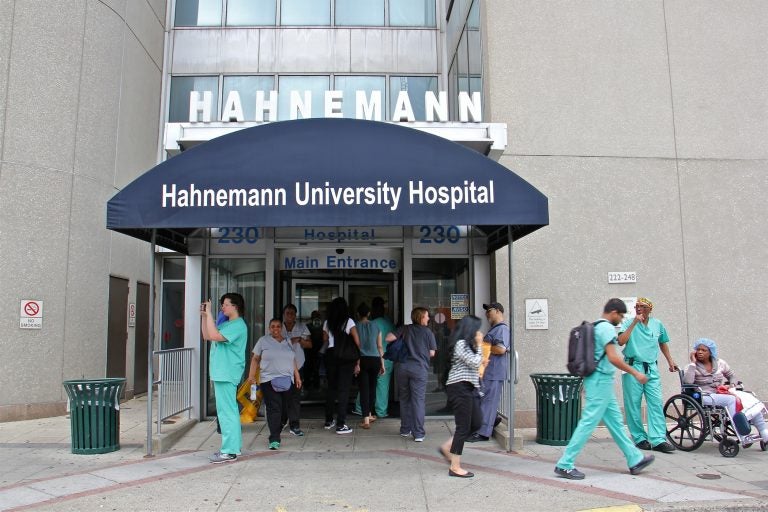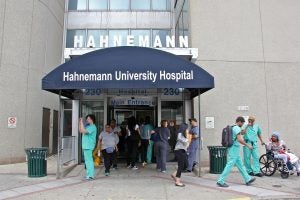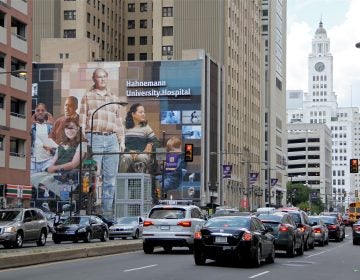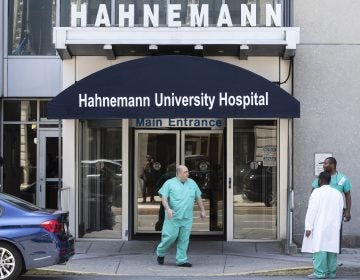Judge rules Hahnemann can sell its residency programs to highest bidder; closure plan delayed
The hospital's lawyers could not agree on a closure plan with city and state health officials in time for Friday’s scheduled hearing, and the matter was pushed to next week.

The entrance to Hahnemann University Hospital on North Broad Street in July, before the hospital was shuttered. (Emma Lee/WHYY)
The fate of Hahnemann University Hospital was scheduled to be decided Friday in U.S. Bankruptcy Court in Wilmington. But lawyers for Philadelphia Academic Health System, the hospital’s owner, could not reach an agreement on a closure plan with city and state health officials in time for the day’s scheduled hearing, and the matter was pushed to next week.
“I’m anxious to see it,” Bankruptcy Judge Kevin Gross said, referring to the closure plan.
Attorney Mark Minuti, representing Philadelphia Academic Health, said the plan would be made public once it is final.
Philadelphia Academic Health announced at the end of June that the 495-bed safety-net hospital in Center City would close by Sept. 6; it filed for Chapter 11 bankruptcy soon after. Hahnemann is also the main teaching hospital for Drexel University’s College of Medicine, whose more than 570 residents and fellows will need to find new positions when the hospital closes. Hahnemann, Drexel and Tower Health, which runs six hospitals in the Philadelphia area and in Reading, have proposed shifting the hospital’s teaching operations to Tower.
The only matter considered by Judge Gross on Friday was the bidding procedure for the sale of the residency and fellowship slots. Tower is offering $7.5 million to Hahnemann for its national provider ID number, its Medicare provider number (which allows an institution to receive funding for doctors in training), and the Pennsylvania Department of Health license to operate an acute care center and resident-training program. The bidding procedure will allow other health systems to bid at that price or higher by Aug. 5.
“I do think the proposed transaction is as much as possible for the greater good, for the good of as many residents as possible,” said Gross, who approved the bidding process.
There were a series of objections to the proposal to sell the residency slots, however.
The first came from a Justice Department lawyer representing the Centers for Medicaid and Medicare Services, which funds doctor training at teaching hospitals. DOJ attorney Marc Sacks said that the bidding procedure could lead to an illegal sale. While institutions can apply to accept individual residents, he explained, there is no basis for the full transfer of a residency program when a hospital closes, according to CMS policy. Sacks said that can be done only if the purchaser accepts full liability that comes along with the residency programs, which he said the purchaser has not agreed to at this point.
“It’s simply a non-starter as CMS sees it at this point,” Sacks said
The State of Pennsylvania also objected because it has not received an application from Tower Health to take on the necessary state-issued medical license.
The Accreditation Council for Graduate Medical Education (ACGME), the organization that accredits teaching hospitals, objected along with the Association of American Medical Colleges and the Educational Commission for Foreign Medical Graduates, which sponsors the J-1 visas for international doctors in training. Their objections came on behalf of the residents themselves, about 20 of whom, dressed in white lab coats, sat in the back of the courtroom. Their main issue is the release of residents’ CMS funding.
Under the proposed deal, residents are not required to go to Tower Health’s hospitals. They can find training opportunities with hospitals that will take them elsewhere in the country. Doug Carlson, who represented the ACGME, said many, if not all, of the residents have been offered other positions. The latest tally is 1,339 available positions nationwide, with about 375 in the Philadelphia area.
But for the residents to be attractive candidates, those receiving hospitals have to be confident they will be able to access the Medicare funding that comes along with the positions. That’s typically between $100,000 and $150,000 per resident, some of which goes toward the residents’ salary and some of which goes toward hospital costs associated with hosting residents, such as insurance and facilities. Hahnemann has not yet released the funding, although about 12 residents have already left without it.
Minuti, representing Philadelphia Academic Health, said half of the Hahnemann residents would be free to go with Medicare funding as early as next week and the other half would be released by Aug. 9. He did not specify which half. But Minuti conceded that Hahnemann does not have the funds to release the residents will all their Medicare funding. That’s because Hahnemann subcontracted a portion of some residents’ time to other hospitals, where they do some of their training, he explained.
“We wish it were different, but that’s where we are,” Minuti told Judge Gross.
Raluca McCallum, a third-year radiology resident, addressed the judge, reading from a letter on behalf of medical graduates. She said she took umbrage at the way the residents’ expensive, difficult medical education and personal lives were being treated as commodities to be bought and sold.
“It’s the perception that residents are viewed as nothing more than assets, the sale of which might offset debt,” McCallum told Gross.
She said the residents feel that being stuck at Hahnemann, whose patient census is down to 30, is compromising their education.
Attorneys for Tower Health said they would start accepting residents Saturday with a proportionate piece of the funding cap that applies to them. Lawyers for Philadelphia Academic Health refuted the idea that people were for sale.
“We are not in any way today selling residents,” Minuti said. “What we are selling is optionality.”
Though most of the discussion in the courtroom revolved around the release of the residents’ funding, the judge agreed with attorneys for Hahnemann that most of those objections pertained to the sale itself and could be dealt with later. He approved the bidding process.
Hahnemann has about $87 million in unsecured trade debt, according to court filings. It owes $58 million to MidCap Financial, the hospital’s post-Chapter 11 petition lender, allowing the hospital to pay its bills as it winds down operations. The hospital’s former owner, Tenet Healthcare, said Philadelphia Academic Health owes the company $41 million in unpaid information technology and bill payment services that were included in a transition contract signed when the ownership shifted in early 2018. Drexel University College of Medicine said Philadelphia Academic Health owes the school $13 million in claims.
In addition to the closure plan, the judge has yet to rule on a proposal to sell St. Christopher’s Children’s Hospital, also owned by Philadelphia Academic Health. The hospital, which is financially profitable, was included in the Chapter 11 filing.
Lawyers for the hospitals’ owner said they wanted to sell St. Christopher’s quickly to maximize the assets for all creditors. A group of four Philadelphia-based hospitals have expressed interest in coming together to buy St. Christopher’s, but did not list a price.
WHYY is your source for fact-based, in-depth journalism and information. As a nonprofit organization, we rely on financial support from readers like you. Please give today.






